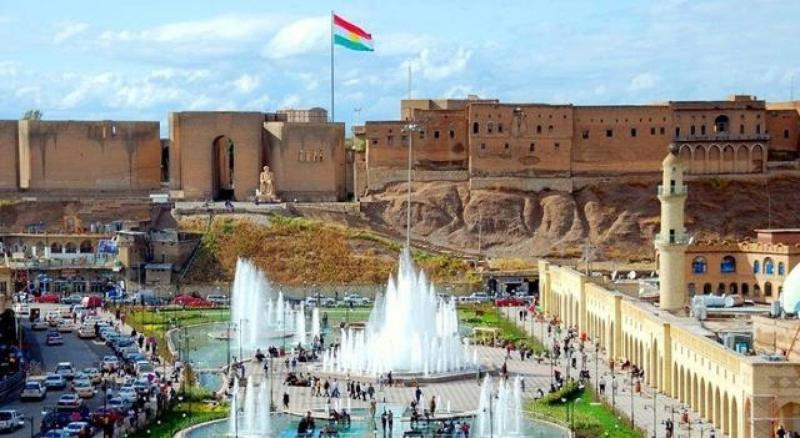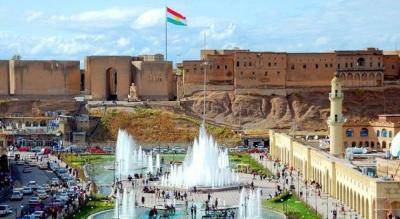The sensitive political situation surrounding the visit of the President of the Kurdistan Region is expected to signal a strong recovery in the development of diverse political, economic, and cultural relations now and in the future. The region is in greater need than ever to work together to build closer ties among neighbors, especially among the three countries of Iran, Turkey, and Iraq. These countries, in their efforts to build further relationships and understandings with a stable and constitutional "non-state" such as the Kurdistan Region, are strategically positioning themselves amid competition while politically aligning themselves.
Amid the Gaza war and its serious repercussions that have directly affected the world and spread its fiery sparks to regional countries, embracing a policy of adaptation and peaceful rapprochement has become a strategic and vital necessity, not just for the Kurds in the Kurdistan Region, but for all neighboring countries and peoples.
The prominent Kurdish role in the region received international support for the Kurdistan Region after 2005, when U.S. foreign policy focused heavily on Iraq and the Middle East, enabling the Kurds in Southern Kurdistan to play a significant role in the region's dynamics. This coincided with Turkey's political openness towards the Kurds in the north, keeping the door open for economic assistance and diplomatic opportunities through Iran. The active and noble participation of the Peshmerga forces in the global fight against terrorism has led to outcomes that have made Kurdistan a quasi-international entity (similar to or close to statehood), directly influencing the formulation of the regional political landscape, particularly the policy and strategy in the four countries under whose rule the Kurds reside.
The visit by Mr. Nechirvan Barzani, the President of the Kurdistan Region, to Baghdad, followed by Turkish President Recep Tayyip Erdoğan's visit to Baghdad and then to Erbil, where he met with Kurdish leader Mr. Masoud Barzani, the President of the Region, and the Prime Minister of the Region, and subsequently a short while later, Barzani's visit to Tehran and his meetings with the Supreme Leader, President, Speaker of the Iranian Parliament, the Foreign Minister, and several senior officials, has demonstrated that the political systems of these two significant countries in the region have accepted the Kurdistan Region as part of the regional and international relations framework. This opens a different situation and a new era for the Kurds and the entire regional power policy and its outlook on the world, granting the region a place in the political and power club and shaping the governance map of the area.
The geopolitical landscape surrounding Kurdistan is likely to interpret the outcomes of the visit as indicating that the geopolitical map surrounding the region is no longer defined by four walls and a single door, but rather in accordance with the diplomatic objectives of the Kurdistan Regional Government and the new strategy supported by the Kurdistan Democratic Party, which potentially allows for each wall to have a clear crossing and gateway for peace, collaboration, and shared sovereignty. This could be the answer to the historical question of whether Kurdish diplomacy has reached a stage where it can open a gateway for geopolitical might through tolerance and common interests rather than fractures, windows, and blind tactics for infiltration.
Now, the Kurds are moving away from their regional, square, and rectangular ties, positioning themselves at the center of regional and global relations, either as a self-governing region unrecognized as a state or as a historical cause with a role and influence in shaping the political map. Although the Kurdish issue has always been the epicenter of conflict in the past, there are clear signs of change from outside to a foundation for building and stability that works towards the economic security, geographical security, social security, and cultural richness of the four countries: Turkey, Iran, Iraq, and Syria.
At first glance, Mr. Nechirvan Barzani's tour appears to create opportunities and interests, redefining them anew instead of continuing the stagnation of issues and conflicts between the Islamic Republic and the Kurdistan Region. Political, security, and economic changes govern the path of the region, and regardless of the intellectual factors of change and how they arise, they do not undermine the reality that we live in a world where everyone faces pressure from political, security, economic, and cultural changes, ultimately under international humanitarian scrutiny.
Any party, whether Kurdish or another neighboring force, by changing its policies, strategies, thoughts, and self-change map to ideas, programs, and political perspectives on the world, represents a valuable and highly effective initiative for building balance for the sake of national and communal interests. What if the region takes the lead in reform, change, and renewal of its political norms, thereby restoring stability to a region suffering from unprecedented turmoil and crises, positively shifting the security perspectives and dominance of its neighbors?
The Kurdistan Region and the Islamic Republic are making earnest efforts to maintain a common language of understanding and to restrain crises and tensions between them. From the perspective that the President of the Kurdistan Region, alongside the significance of Ankara's and Baghdad's positions, understands well Tehran's role and influence in establishing lasting peace and stability in the Kurdistan Region. The Kurdish movement in general, and the Kurdistan Democratic Party in particular, share a common legacy of struggle against the destructive Baath dictatorship throughout the 1980s. Therefore, this past offers the potential to save their relationship from all difficulties, conspiracies, misunderstandings, and doubts.
It is evident that the international relations of the Kurdistan Region have been intensively worked upon in recent years and have notably improved. Perhaps now is the right time to renew and develop regional relations, as such relations accelerate normalizing the economic and security situation, socializing the country, and achieving stability among neighboring countries, which will positively reflect not only on the region but also on the interests of all parties involved.
From reading the views and statements of the President of the Region and the general policy of the Kurdistan Region, it appears that the Kurds, within the framework of shared interests, are ready to work with their neighbors, especially Tehran and Ankara, as long as they are cooperative and provide guarantees. Regarding the issues signed in Baghdad between the federal government and the Kurdistan Regional Government, the foreign policy emanating from both capitals will not negatively affect them.




